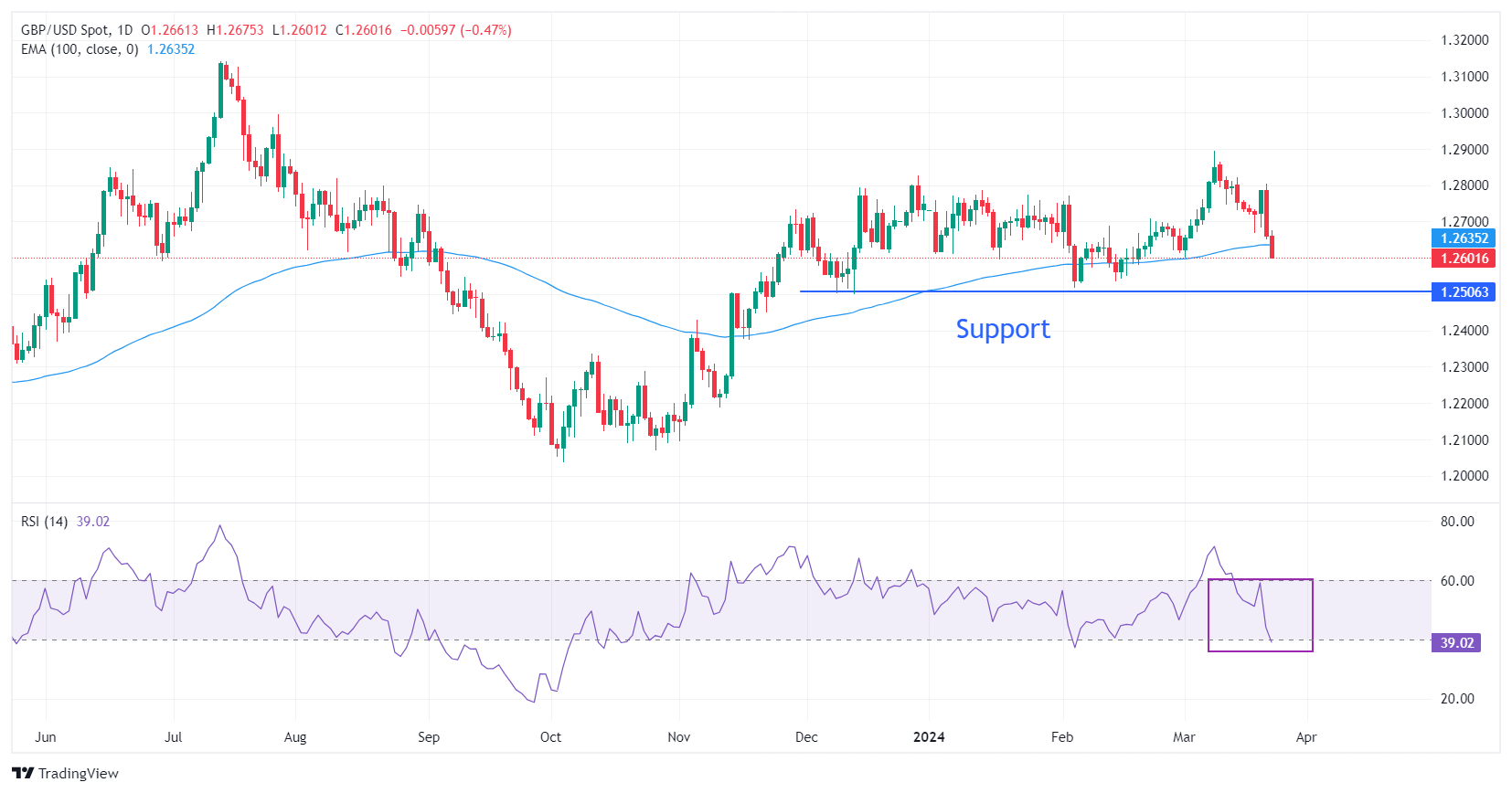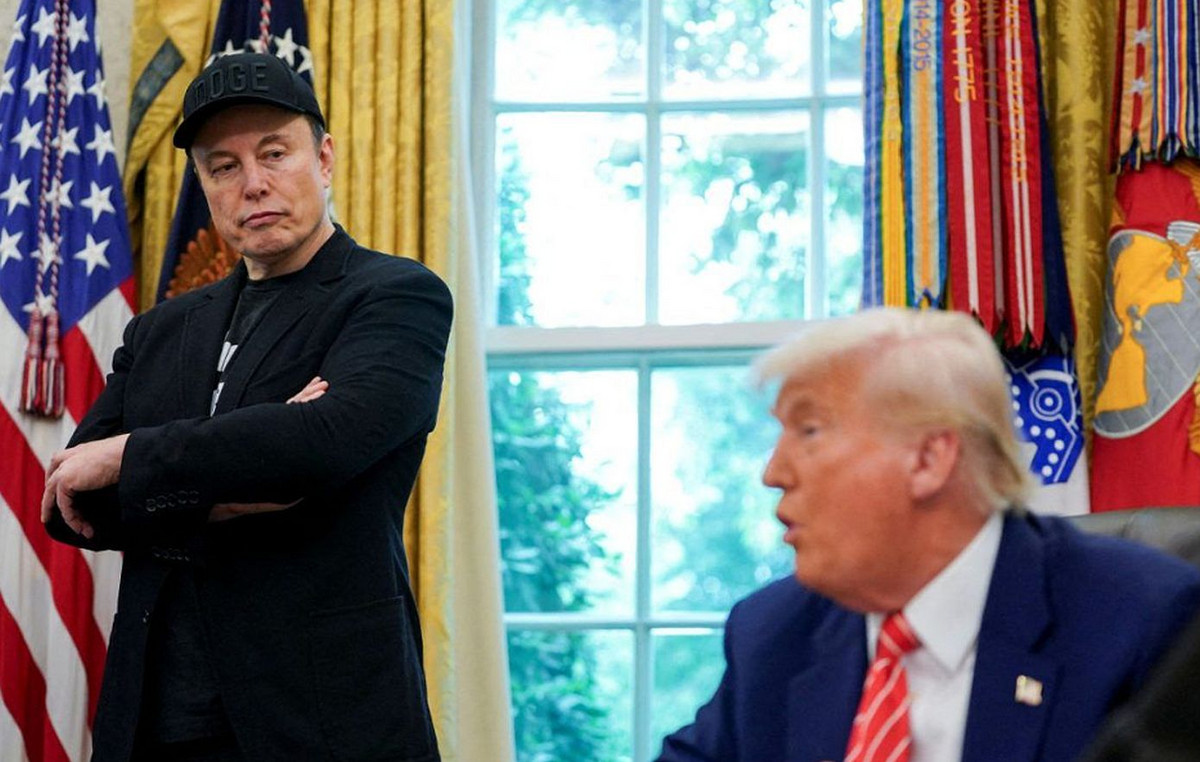- The Pound falls on growing expectations that the BoE will choose to cut interest rates this year.
- Catherine Mann's comment to keep interest rates unchanged in March boosted the BoE's rate cut prospects.
- UK retail sales data for February was better than expected, although it signals little momentum in spending among households.
The British Pound (GBP) remains vulnerable against the US Dollar in the latest session on Friday in London, as market sentiment is quite bearish. The GBP/USD pair finds no support as rising expectations that the Bank of England (BoE) will cut interest rates this year outweigh February retail sales data, which broadly beat market expectations.
The UK's Office for National Statistics (ONS) reported that monthly retail sales were unchanged after rising a significant 3.6% in January, a figure that was revised upwards from 3.4%. Investors had anticipated a sales decline of 0.3%. On an annual basis, sales contracted 0.5%, compared to expectations of a 0.7% decline.
Retail sales data are an indicator of the current state of consumption, which represents an important part of the economy. Retail sales were slightly better than expected, but not enough to offset risk aversion in the global market.
A slower decline in retail sales appears insufficient to offset the impact of increased expectations that the Bank of England (BoE) will cut interest rates from August. However, higher wage growth will continue to worry BoE policymakers as they strive to bring inflation down to the 2% target.
Daily summary of market movements: The Pound falls sharply and the Dollar advances
- The British Pound updates its monthly low at 1.2580 as market sentiment remains bearish and US Dollar strength renews. The Dollar Index (DXY), which measures the value of the dollar against six major currencies, hits a new two-week high around 104.20.
- Short-term demand for US dollars is strengthening as inflation in the US economy has remained persistent and the Federal Reserve (Fed) has revised upwards its gross domestic product (GDP) forecasts to 2.1% for 2024. By contrast, inflation in other developed economies is slowing at a faster pace, while the risk of recession is also higher.
- Domestically, the British pound weakens after the BoE opted on Thursday to keep interest rates at 5.25% for the fifth consecutive time. Investors judged the BoE to be slowly becoming dovish as two policymakers, Catherine Mann and Jonathan Haskel, who supported a further hike in interest rates at the February meeting, voted to leave them unchanged. .
- Eight of the nine policymakers voted to keep interest rates unchanged, except Swati Dhingra, who supported a rate cut. This was the first time since September 2021 that no member of the Monetary Policy Committee voted in favor of a rate hike.
- In the monetary policy statement, the BoE said inflation is moving in the right direction, but is not at a point where interest rates can be lowered. Expectations that the BoE will cut interest rates from August rose after Governor Andrew Bailey said: “I think it's reasonable that markets are 'thinking' about two or three cuts this year, but I won't comment on them.” the calendar”.
- Regarding the economic outlook, BoE Bailey said the economy is returning to a growth path after remaining in a technical recession in the second half of 2023.
Technical Analysis: Pound Sterling Dips Below 1.2600 After Sharp Fall

The British pound marks a new monthly low below 1.2600 in a bear market context. Short-term demand for the GBP/USD pair weakens as it has fallen below the 100-day EMA, which is trading around 1.2635. The asset is expected to find a cushion near the horizontal support drawn from the December 13 low at 1.2500.
The 14-period Relative Strength Index (RSI) falls to 40.00. A bearish momentum would be activated if the RSI falls further.
BoE FAQ
What does the Bank of England do and how does it impact the Pound?
The Bank of England (BoE) decides the UK's monetary policy. Its main objective is to achieve price stability, that is, a constant inflation rate of 2%. Its instrument to achieve this is the adjustment of basic loan rates. The BoE sets the rate at which it lends to commercial banks and at which banks lend to each other, determining the level of interest rates in the wider economy. This also influences the value of the British Pound (GBP).
How does the Bank of England's monetary policy influence the Pound Sterling?
When inflation exceeds the Bank of England's target, it responds by raising interest rates, which makes access to credit more expensive for citizens and companies. This is positive for the British Pound, as higher interest rates make the UK a more attractive place for global investors to invest their money. When inflation falls below target, it is a sign that economic growth is slowing, and the Bank of England will consider lowering interest rates to make credit cheaper in the hope that companies will borrow to invest in projects that generate growth, which is negative for the Pound sterling.
What is Quantitative Easing and how does it influence the Libra?
In extreme situations, the Bank of England can apply a policy called Quantitative Easing (QE). QE is the process by which the BoE substantially increases the flow of credit into a clogged financial system. QE is a policy of last resort when lowering interest rates does not achieve the necessary result. The process of QE involves the Bank of England printing money to buy assets, typically government bonds or AAA-rated corporate bonds, from banks and other financial institutions. QE usually results in a weakening of the British pound.
What is Quantitative Hardening and how does it influence the British Pound?
Quantitative tightening (QT) is the reverse of QE, and is applied when the economy is strengthening and inflation begins to rise. While in QE the Bank of England (BoE) buys government and corporate bonds from financial institutions to encourage them to lend, in QT the BoE stops buying more bonds and stops reinvesting the maturing principal of the bonds that you already own. It is usually positive for the British pound.
Source: Fx Street
I am Joshua Winder, a senior-level journalist and editor at World Stock Market. I specialize in covering news related to the stock market and economic trends. With more than 8 years of experience in this field, I have become an expert in financial reporting.





